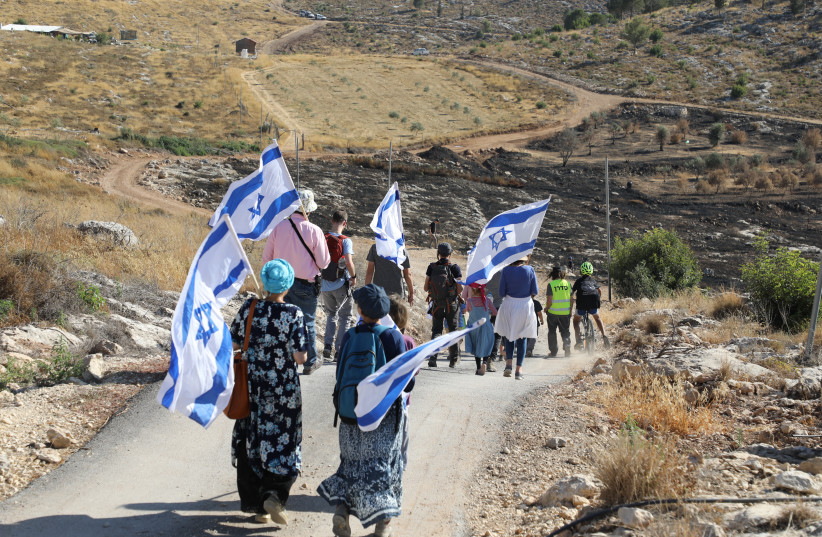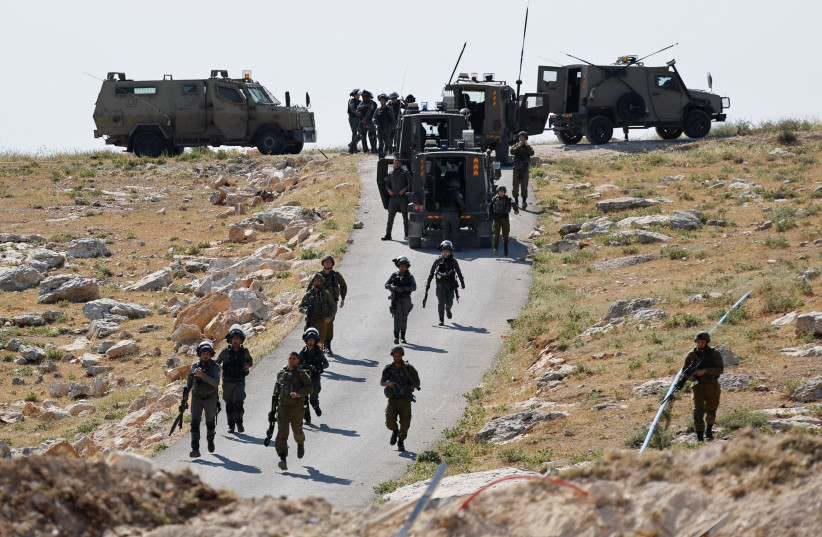‘Ending that occupation’ without a solid peace agreement is impossible, here’s why – opinion
According to the European Union, which influences policymaking in the international community, Israel’s occupation of the “West Bank” (areas that the IDF conquered in 1967) is a “violation of international law” – the Hague and Fourth Geneva Conventions – and is illegal; therefore, Israel must withdraw to the 1949 Armistice lines.
While this is a powerful and effective emotional and psychological weapon against Israel, few understand that, for Palestinians, “the occupation” includes all of Israel, everything “from the [Jordan] river to the [Mediterranean] sea.”
The EU’s position, however, is baseless
The League of Nations recognized the right of the Jewish people to a homeland in the area; this was incorporated into the UN’s Charter (Article 80). The FGC defines “occupation” as occurring between states (“high contracting parties”); only Israel qualifies.
The International Committee of the Red Cross, however, declared that Israel was guilty of illegally “occupying Palestinian territory.” And, since the ICRC has special observer status at the UN and a special position in the FGC, its decisions are considered authoritative. The EU and UN adopted this as “humanitarian law.”
 MARCHING WITH signs reading ‘preserving and saving the Israeli land,’ in Bat Ayin and Gush Etzion junction, June 21. (credit: GERSHON ELINSON/FLASH90)
MARCHING WITH signs reading ‘preserving and saving the Israeli land,’ in Bat Ayin and Gush Etzion junction, June 21. (credit: GERSHON ELINSON/FLASH90)Although Israel withdrew from Areas A and B in Judea and Samaria as stipulated in the Oslo Accords, and assisted the Palestinian Authority to develop its institutional structure, the focus turned to denying Israel’s legal and historical claims to Area C, where all of the “settlements” are located. The debate over further territorial concessions, however, ended because terrorism and incitement continued unabated. Moreover, Iranian proxies – Hezbollah in Lebanon and Hamas in the Gaza Strip – were empowered. The mantras of “land for peace” and “the two-state solution” became irrelevant, even for many in the international community.
Many argue that Israel should not rule over others as a moral issue. “The occupation,” they claim, is not only about territory but is about depriving “the Palestinian people” of a state, “self-determination.” Shifting to a humanitarian argument is persuasive because it is a value. As a moral issue, they claim that Israel has no right to control another people – Palestinians – and “occupy” their land. This vilifies Israelis (i.e. Jews) as persecutors of Palestinians as victims.
This amplifies the question of the legality of settlements to include a moral issue, the alleged violation of human rights.
That is the elephant in the room; for example, charging that Israel restricts where Palestinian Arabs can live, interferes with their daily lives, invades their towns and villages to apprehend terrorists, and violates their civil and human rights and constitutes “occupation.”
Ending that occupation without a solid peace agreement is impossible
Ending that occupation unilaterally, therefore, without a solid peace agreement is impossible because (1) Palestinian terrorists are a constant threat, (2) radical Islamists and countries such as Iran are involved in promoting terrorism, and (3) a unilateral Israeli withdrawal from Area C and the creation of a terrorist-led Palestinian state is an existential danger.
Using legal and humanitarian arguments to justify Palestinian demands ignores Israel’s legitimate claims to Judea and Samaria and its security needs.
Therefore, Israel is trapped: as long as it refuses to grant Palestinians a state, holds on to Area C, and maintains its anti-terrorism activities, it will be accused of “occupation” and “persecution” of Palestinians. Moreover, resistance to “the occupation” is used to justify terrorism. The dilemma has profound consequences.
“Ending the occupation” suggests an immediate and direct distinction between good and evil – and that is where it is most effective.
Regardless of the details, the mantra creates a psychological determinism that forces an “either-or” decision. Once the premise that occupation is evil is accepted, the conclusion is inevitable. That’s why mantras are so powerful: they don’t require critical thinking and in fact, prevent it.
That’s also why advertising works: Coke makes you think sweet, pleasant, satisfying; you don’t think about whether it’s good for you, or not. Similarly, “end the occupation” implies that Israel is bad and Arab Palestinians are innocent victims. It’s a form of brainwashing which, like an addiction, alters perception and promotes rationalizations: Don’t worry, it will be okay; we’ll be happier, appreciated, loved; we can control the consequences.
 Israeli troops take position during clashes between Palestinians and Israeli troops after Israeli machinery demolish a school near Bethlehem in the West Bank May 7, 2023 (credit: REUTERS/MUSSA QAWASMA)
Israeli troops take position during clashes between Palestinians and Israeli troops after Israeli machinery demolish a school near Bethlehem in the West Bank May 7, 2023 (credit: REUTERS/MUSSA QAWASMA)Mantras such as “settlements prevent peace,” “Israel is occupying Palestinian land,” and is a “colonialist, apartheid state” are intended to generate empathy and a sense of injustice, whether true or not.
Finally, “ending the occupation” demands that Israel must unilaterally give up tangible assets (e.g. territory and security) for intangible agreements (e.g. diplomatic rewards which are easily revocable and ignored).
The only way to fight against brainwashing and addictions is to engage in critical thinking and a realistic evaluation of the situation. The first priorities of a state are to protect its population, preserve its society, and defend itself. That’s why all countries have armies, police forces, and prisons.
Since many Arab Palestinians and others seek to destroy Israel, Israel is obligated morally and practically to defend itself. Capitulation and surrender to terrorism are not viable options.
Second, a Palestinian state west of the Jordan River would not become a democratic peaceful regime, or resolve the problem of millions of “Palestinians” who live in Israel and other countries. The danger that it would be a failed state run by terrorist gangs and militias, like Somalia, is real.
As long as terrorism exists there will be “occupation,” checkpoints, and interventions by the IDF and police. “Ending the occupation” begins with ending incitement, Jew-hatred, and terrorism.
The slogan, “End the occupation” is not a call to protect Palestinian rights, but to end Israel’s existence. It’s not a plea for humanity, but a paean to commit mayhem and genocide.
The writer is a PhD historian.





Comments are closed.